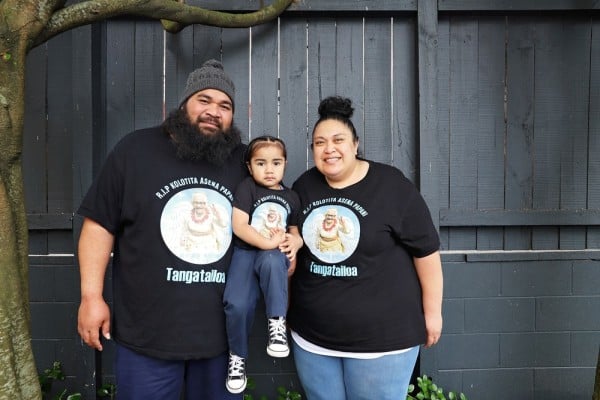If you're a frequent visitor to Healthify, why not share our site with a friend? Don't forget you can also browse Healthify without using your phone data.
Respectful relationships
What does a happy, healthy partnership look like?
Key points about respectful relationships
- The quality of your relationship with your partner is important to your overall wellbeing and hauora.
- Although most people treat their partners with respect, some believe they have more rights and power than their partner does.
- Challenging these ideas and learning how to treat your partner with respect will not only give you a better relationship but will also lead to a happier, more satisfying life.
- Knowing what a healthy relationship looks and feels like is key to building a great and lasting partnership.

A healthy relationship isn't about trying to changing your partner, but about loving and supporting their dreams, goals and personal growth.
Respecting each other means:
- being completely honest with each other
- treating each other fairly
- feeling equal and valued
- supporting each other's growth
- trusting one another's choices
- accepting each other exactly as you are.
This kind of relationship makes you feel good about yourself and brings out the best in both partners. When you’re in a healthy, respectful relationship, you feel confident, happy and secure in yourself. It's a great thing to model for your tamariki too.

Image credit: Healthify He Puna Waiora
A relationship is not respectful or healthy when:
- Your partner controls you through fear, isolation or manipulation.
- You feel unsafe, pressured, under-valued or disrespected, even just some of the time.
- Your partner:
- limits your freedom and tries to cut you off from friends or whānau
- makes you afraid to disagree or speak up
- blames you for their own harmful actions
- ignores your opinions and feelings
- uses emotional or physical intimidation, bullies you or gets angry a lot
- controls your access to money and personal choices
- humiliates you or puts you down in public or privately.
Red flags
- You feel constantly anxious around your partner and you ‘walk on eggshells’ so you don’t make them mad.
- You change your behaviour to avoid getting into a fight.
- Your confidence and self-esteem are shrinking or non-existent.
Remember, a healthy relationship is built on trust, respect, and freedom, not fear and control. These behaviours are forms of abuse and are never ok or ‘normal’ in a healthy relationship.
Try answering the questions on the Are You OK? site(external link) to see if your relationship is abusive. Read more about abuse and safety.
Being equal
A key aspect of any healthy relationship is equality. That means both people in the relationship have equal say. One person shouldn’t have power or control over the other person, and one person shouldn’t put another on a pedestal and look up to them all the time. Decisions should be made together, not by one person for the other person. Both voices must be heard fairly and decisions reached together. One person should not be 'in charge' of the other person and both partners should feel appreciated and respected.
Communication
Good communication involves being a good listener and talking openly about how you’re feeling. It also involves respecting the other person’s thoughts, feelings and opinions. Good communication helps you feel connected and supported.
While it’s important to talk about the ‘good’ stuff, it’s just as important to talk about hard or difficult topics together. A lot of misunderstandings in relationships come down to lack of, or poor, communication. But by talking openly, you can often nip issues in the bud and build trust to move forward together.
Conflict arises in all relationships. It’s natural to disagree with one another and even argue over things. The key is how you manage your differences. Talking things through calmly and in a respectful way can help resolve disagreements. Sometimes you need to ‘agree to disagree’ while accepting the other person might have a different point of view from yours. Being open to learning new ways of thinking, trying new approaches and respecting each other’s values and opinions is a healthy way to grow in your relationship.
Consent
Consent to sexual activity in any kind of context or relationship should never be assumed. You must never pressure a person into doing something they’re not comfortable doing. Both people must agree and each person has a right to change their mind at any time. Sexual activity without consent is illegal. The consequences of sexual assault can be long-lasting. Read more about sexual consent.
Taking responsibility
It’s important to take responsibility for your own actions if you're violent, controlling or disrespectful towards your partner. If you find yourself in that situation you need to take steps to change your behaviour. Begin by believing your life can get better, talking to someone you trust, becoming aware of your feelings and learning about your own behaviour. See the support section below to find out where you can get help if you need it.
Sometimes being respectful means knowing when to end a relationship. We’re all likely to experience a relationship break-up at some point in our lives. Sometimes it can be a good thing if the relationship wasn’t making you happy. But it can be a big shock if it's not something you wanted to happen.
When you’re going through a break up – whether you’re the one ending the relationship or not – try to remember that it’s better not to struggle on in an unhappy relationship, or one where the other person doesn’t feel the same way as you do.
Try and treat a break-up as a good opportunity to learn more about yourself and focus on what you really want and who you want to be in your future relationships.
Being flexible
Relationships change over time and people change and grow in different ways. Remember to be flexible and willing to compromise. Try to approach new challenges and experiences with an open mind and a positive attitude.
Helping others
You can help others around you to be respectful to their partners. Model good behaviour in your own relationships with loved ones. Encourage whānau and friends to respect their partners and talk about what it means to be in a healthy relationship. You could show them this page or send them a text link.
| White Ribbon NZ have created a short film called "Raise Our Men" which explores how New Zealand men are trapped in a restrictive 'Man Box' of being in charge, appearing tough, and only expressing anger, which increases risks of violence. The film highlights men's experiences in breaking free to become more equal, flexible, and respectful. You can watch "Raise Our Men" on YouTube(external link). |
Remember, if you hear or see anything disrespectful, speak up and let the person know it’s not okay to speak or act like that.
Video: 8 habits of healthy relationships
(Psych2Go, US, 2020)
White Ribbon(external link) is an organisation working towards ending men’s violence against women. They’ve produced a toolbox(external link) for men that gives practical tips on how to treat women equally and with respect.
You, Me, Us(external link) provides advice on healthy relationships and what to do when things go wrong for the LGBTI (lesbian, gay, bisexual, transgender, intersex, takatāpui, queer, fa'afafine) community.
If you are concerned about violence, these organisations can help or offer advice:
Check it out(external link) Are You OK? New Zealand Govt, NZ Answer some questions to check how your partner or ex's actions impact on you
E Tū Whānau!(external link) Te Mana Kaha o Te Whānau – E Tū Whānau is a movement for positive change developed by Māori for Māori. It’s about taking responsibility and action in your community and supporting whānau to thrive
Unhealthy relationships(external link) Skylight, NZ
What is a healthy relationship?(external link) University of Auckland, NZ
Brochures
Healthy relationship tips(external link) Mental Health Foundation, NZ, 2022
Respectful relationships and interactions in Aotearoa New Zealand(external link) University of Waikato, NZ
Respectful relationships – Pasifika people living our values(external link) Le Va, NZ, 2023
References
- White Ribbon Toolbox(external link) White Ribbon, NZ
- Respectful relationships(external link) Queensland Centre for Domestic and Family Violence Research, Australia, 2019
- Respectful relationships(external link) Family Planning New South Wales, Australia, 2025
Credits: Healthify editorial team. Healthify is brought to you by Health Navigator Charitable Trust.
Last reviewed:





